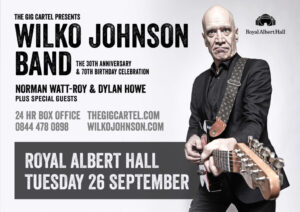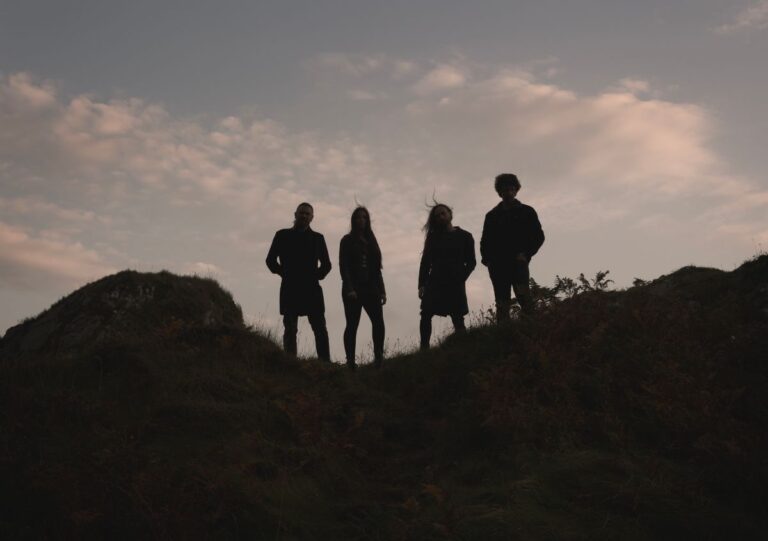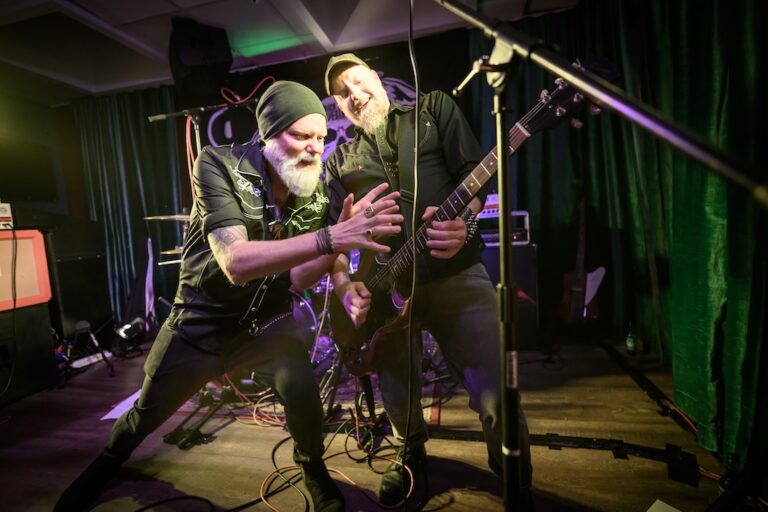It’s not often one has the privilege of talking to a genuine guitar legend, and so it is not without trepidation that I await the time allotted for my interview with Wilko Johnson, formerly of Dr Feelgood and proud keeper of the blues flame for seventy miraculous years.
Miraculous because Wilko should not be with us today.
Diagnosed with inoperable pancreatic cancer and given ten months to live, Wilko responded in the only way he knew how, throwing himself into a worldwide tour and, eleven months after the diagnosis, recording an astonishing album with Roger Daltrey entitled ‘going back home’.
A blazing triumph of a record, it rendered its creator as a vital force rather than someone at death’s door and, although Wilko was not, at that time, out of the woods, it ended up serving as a celebration rather than a eulogy.
Since that turbulent time, Wilko has put pen to paper for an autobiography, toured (a lot), been the subject of a Julian Temple documentary (‘The Ecstasy of Wiko Johnson) and even starred in Game of Thrones as an executioner. For an artist of any age, this would be a heavy workload, but for Wilko, about to hit seventy (his birthday is on the 12th July, whilst there is an epic celebration at the Royal Albert Hall in September), it is simply an opportunity to enjoy a life that he thought he’d lose.
And so, at twenty past four on a sunny Thursday afternoon, I’m waiting, heart in my throat, to talk to an artist whose output has influenced everyone from blues musicians to punks.
I dial. I sweat a little…
And then he answers, his voice warm despite the fact that I’m pretty sure he’s got a list of interviewers as long as my arm still to get through, and he talks freely about his recent career, laughing frequently and sharing details of his remarkable record with Roger Daltrey, the trials of writing an autobiography and the inspiration for his unique guitar style…
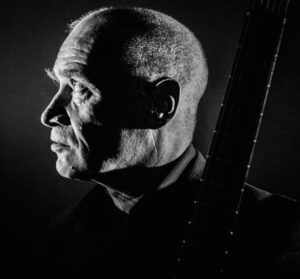
Hello.
Hi, is that Wilko?
Yes it is…
Hi, this is Phil from SonicAbuse – thank you so much for agreeing to talk to me.
You’re welcome.
I know you’ve got a lot of interviews today, so I’ll get straight on:
The last couple of years you’ve had a huge amount of activity and one of the things you did recently was a compilation for Chess Records, and I wanted to ask about that because I believe it’s important in the blues to pay tribute to your roots and I wanted to ask how you approached making that compilation?
Well, when I was a teenager, Chess… discovering the music that there was on Chess Records and these blues men and so forth, was such a revelation, it was just such a revelation and every time you saw a Chess record you got a little tingle of excitement because you knew there’d be something great on it. So, Universal Records gave me the easiest job in the world! [Laughs] You know, make a compilation of Chess! And what you’ve got there is an embarrassment of riches. It was great because they sent me all the CDs, so I’ve got them all and yeah, just thinking of one track after another. There’s so much great music on Chess, it was a pleasure to do.
The other thing you have had out most recently was a compilation of your own material – were you involved in that at all?
Not at all!
So, you’re very much more interested in moving forward than focusing on past efforts?
Yeah, well I mean, actually… the last couple of years, things have been strange. I’ve been recovering from my time in hospital and getting back up to speed with my playing and realising that it all still works! And we’ve been playing some great live gigs and now it’s time for a new record, right? We’ve just had a couple of days rehearsal and I’m quite excited about it and as soon as possible we’re going to record a new album, yes.
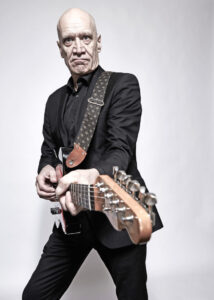
The last album was ‘Going back home’ which, obviously, was recorded under something of a cloud, but I also understand you did that record in eight days?
Absolutely! And you know all the circumstances around that record were brilliant because I was just into my… the doctors gave me ten months to live, right?
…and we were into the eleventh month when we did that! We were already in extra time, you know, and yeah, we just had this quick eight days when Roger was available and when we were available and so we had to do it…
Tthere was no time for messing around or getting philosophical about anything, we just had to whack the tracks down and everyone was getting on great and it was a great experience.
I’m sort of walking around thinking “wow man, I’m gonna die! I’m going to die soon but, I don’t know, I’ve had a good life and finishing it making an album with Roger Daltrey, that’s pretty good!”
So, it was pretty good, and we carried on and it turned out to be a good album, a best-selling album and, in fact, it was the best-selling album I’ve ever made and I did live to see it!
And that record as well came out on the Chess imprint, which must have been really special?
Well, absolutely, it was like you think… I was sixteen and had just discovered blues music and to think that one day you’d have a record on the Chess label! [laughs]
There was an interview with Eric Clapton where he said that the blues was, for him, getting something joyful from sadness and one of the things that struck me about ‘going back home’ is that there was such a sense of vitality and life and energy in spite of the circumstances, so is that similar philosophy to how you make music?
Yeah, well, that record was really everything a record should be. The circumstances and everything, yeah, the atmosphere was… ah the atmosphere was absolutely up, it was joyful. I was having a great time and everybody was and the record was shaping up really good and we were all getting enthusiastic about it and, rather than just being the sort of, like I said, farewell bash, it turned with the aid of the producer, Dave Eringer, into a really great record that I’m really proud of.
I was privileged to see you play last year at Bearded Theory Festival and one of the things that I was curious about was how you played because your style is so unique and unlike anything I’ve ever seen before. How did you develop your style because you seem to attack the strings and then there’s lead work as well, but I can’t figure out how you do it!
[Laughs] Well really, I wanted to copy Mick Green of Johnny Kidd and the Pirates, right? I’d heard a record with him playing on it and he just absolutely riveted me and I just wanted to play like that, with that kind of chopping rhythm and working little lead licks in with it, you know… and the fact of having a three-piece band and just one guitar… but…
I couldn’t figure I out! I tried and I tried but I couldn’t play like Greenie, but I ended up with my way of doing it and it actually is very, very simple.
You know, people will ask how I do it and they think it’s impossible or people think there’s a tape recorder in the back [laughs], playing the other guitar and I always think “what’s the problem! It’s so simple!” and then I saw it myself, for the first time on film and I thought “I don’t know how I’m doing it!” But it is very simple!
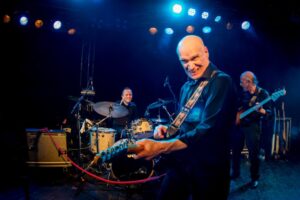
The other thing that you did recently was you finally took the decision to write your own biography, what led to that and how did you approach it?
Well, I did it because the publisher (they’re quite a big publisher – Little Brown) made me an offer. They said that they didn’t care if it was ghost written or if I wrote it, so I said I would.
But, the thing is, I’ve never written a book before, so my method was a bit patchy [laughs] you know. And I thought about why they’d asked me to do it and I figured it was because I’d got so well-known because of the cancer, so all right, I wrote about that and then I figured I should put some biography in to explain to people who I am, so that went in and then it turned into a biography.
It was good – I was typing and I was thinking “Yeah, I’m a writer, I’m a writer, it’s great!” and then I got into the sad bits, like when my wife died, and… when you look back in the past, you just see one day or one image or one picture, you don’t see a consecutive, day-by-day thing, you don’t remember like that, but when you’re writing a book you’ve got to. Oh! And it was so upsetting, it was like it was yesterday and I couldn’t write and I couldn’t write. Anyway, my son beat me up and got me doing it again, but I think now, with a bit more time and a bit more thought I could write a much better one now, but there you go, it’s written and that’s it.
Looking back it sort of feels like Dr Feelgood was never as appreciated as it should have been at the time, maybe because there was a lot of progressive rock around and music that was more direct was almost looked down upon…
Well I don’t know anything about today, but I know then… I think Dr Feelgood had a pretty powerful effect. We brought that thing to London and we were all completely unknown and it was just very direct and simple, so you were just working on the sheer commitment of the band and it was very influential, especially in London. Lots of young persons were observing us then and, in the next year they started to create the punk bands and when I got to know them I realised yeah, that was the starting point for a lot of them. So, it did influence other stuff, but the other parts of music, they go plodding on, but if you put out good rock ‘n’ roll, the people like it.
Do you follow much in the way of modern music, because there are a lot of bands who hark back to that raw blooded music?
I know about the Stripes and I’ve got up and played with them a couple of times, but… I’m no different from most old folks [laughs]. My musical tastes and everything froze in 1972!
You’ve got this birthday celebration at the Royal Albert Hall – is putting together a set list for that challenging?
Not really, I just want to put on a good show. You go on stage and, I mean, you kind of… the numbers you play, you play similar numbers as you go along, you maybe change them here and there depending on the feel of the crowd and you just do it from that, I always do it like that, I couldn’t go with a definite plan, because sometimes you just want a fast one!
Is there anything that you particularly love to play?
Lately I have been enjoying playing that number ‘going back home’ because it’s got a long history and I wrote it with Mick Green, so it’s a song I wrote with my hero and then popularised it recently with Roger Daltrey, so it’s pretty great and people recognise the intro.
All the songs on that record… Roger Daltrey sings his ass off on that record!
Yeah, it’s fantastic!
Especially ‘Ice on the motorway’, that blows you away every single time!
Yeah! Thank you!
It’s been such a pleasure to talk to you and I just have one last question – you mentioned that you’re thinking about a new record, in terms of recording, is it still the case that you like to play live in the studio?
What we’re going to do is go back in the same circumstances and with the same producer and everything as we did with Roger Daltrey and very quickly, so, you know [laughs] that’s our philosophy.
Quick and from the heart
Yeah!
Thank you so much for your time, it’s been a pleasure to speak to you.
Thank you.
2017 is certainly a special year for Wilko Johnson. Not only does it mark the 30th anniversary of the Wilko Johnson Band, but this year sees the guitarist celebrating his 70th birthday.
Given the events of recent years, this celebration at the Royal Albert Hall is all the more meaningful: here is the death-defying Wilko Johnson leading his own party with partners in crime Norman Watt-Roy (bass), Dylan Howe (drums), family, friends and special guests.
‘I’m supposed to be dead!’ So says Wilko in a recent interview, having been diagnosed in late 2012 with terminal pancreatic cancer. Despite the doctors’ predictions he continued to perform and present himself with vigour and a new zest for life. In 2013, Wilko announced that, thanks to a second opinion and subsequent life-saving surgery, he was cancer-free.
The original Dr Feelgood guitarist, known for his distinctive chopping guitar style, recently found further fame on TV in Game Of Thrones, and also rose up the charts once more after teaming up with Who frontman Roger Daltrey on hit 2014 album Going Back Home, which features incendiary re-workings of songs from Wilko’s Dr Feelgood days including All Through The City and Going Back Home.
The Wilko Johnson Band consists of Wilko on guitar and vocals, plus Blockheads Norman Watt-Roy and Dylan Howe; a rhythm ’n’ blues power trio widely acknowledged as one of the most exciting live acts in the world today.
Keep It To Myself – The Best Of Wilko Johnson was released in February 2017 via Chess /Universal. Wilko’s bestselling memoir Don’t You Leave Me Here (Little, Brown) has recently been published in paperback edition.
Wilko Johnson Band play their 30th Anniversary concert at the Royal Albert Hall on Tuesday 26 September 2017.
Book tickets from 24 HR Box Office – 0844 478 0898 or www.thegigcartel.com
Wilko celebrates his 70th birthday on Wednesday 12th July 2017
